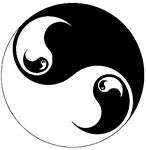
«Egoism and altruism» is a hardy perennial of philosophers and now a staple for academic psychologists. Are people basically self-interested or basically concerned for others?
Trick question. Once the issue is posed like this, any hope of understanding oneself or acting sensibly is lost.
People act in their own self-interest. They must. Some are certainly more self-centred than others. People are also capable of concern for others and demonstrate benevolence. They must. Otherwise it would be hard to live in groups. Again, there is variation amongst people in the degree of altruism. For some of you, it might be hard to live with yourself if you were irredeemably selfish.
The issue is never what academics or philosophers assert people 'are'—and which, supposedly, is what you are or what I am. The issue in real life is always about what am I going to do at this moment in this situation given who I am. The variations here are almost infinite.
Yes, we do have tendencies and styles. But we are not controlled by a quasi-biological and supposedly objective "this is what people are like". The determinants of our world are our choices and our circumstances. We can confront our tendencies. We can alter our circumstances. That is how we create our 'self' and how we create a community.
These reflections follow an RSA Video from Superfreakonomics that describes the findings from lab experiments on altruism. These experiments are so grotesquely unrealistic as to defy belief. The subject is in a lab, is given $10 and invited to give a part of that sum to another person he cannot see or talk with. Various conditions are then stipulated that affect how much of the $10 he can keep.
I'm perfectly happy that exchanges of such experimental methods and data should occur between consenting academics in the privacy of their discipline. People get up to much worse. I am less happy about exhibiting it in front of an innocent audience as if it is all good clean fun from which we can learn.
I am against censorship so my only option is to put my view before the public. So here it is.
The video is reminiscent of a glib conjuror with a willing assistant, delivering a patter that blinds you and distracts you while encouraging you to fall under his spell. Even if you are resistant, you don't want to be a troublemaker, so you don't argue. One person did and was described as an outlier resistant to science! The atmosphere screams that the great economic-psychology sideshow must go on. In the experimental lab, money comes out of nowhere for the subjects who interact with others they do not meet and cannot know.
If you watch the video, you will see that every time the experimental situation is tweaked, the results are different. Rather than learning from this, it should make you sceptical of any possibility of relevance. In real life, numerous factors will be operative with many of them unknown.
One of the conclusions is that you are best off to simulate altruism. So academic science has finally reached the intellectual level of an old Groucho Marx quip: sincerity is the most important thing, once you can fake that, you've got it made.
In THEE, altruism is an aspiration that emerges in relation to issues of your obligation in regard to others. Egoism is the associated constraint. Altruism-egoism is a duality embedded in human nature. You are neither "basically" one nor the other. Egoism and altruism are both natural potentials. Think about it. It is quite possible, even likely, that the conflict of egoism and altruism within us generates a beneficial creative tension. It forces us to face up to ourselves and social possibilities and think more deeply about choices.
So I propose that every time you hear in relation to social life: "scientific experiments show …" you quickly stop your ears and say to yourself: "Life is not an experiment. It's an adventure. What have I learned on my adventure? How do I want to create myself now?" Your conclusions will be far more relevant and useful than anything that emerges from academia. And, in any case, you pay attention to yourself when you make your choices. If you want to refine your understanding of people, then share and discuss experiences with others. (Ground rule: everyone must speak from their own experience and no one is allowed to just appeal to authority e.g. "science has shown that …" or "Aristotle said that …".)
The expectancies that you hold about yourself and others will be a major factor in the life that you experience. By expecting the best of others, you are more likely to get exactly that than if you expect (or worse, believe) that others are basically egotistic, negative, hostile and out to get you. Of course, sometimes they are—but you are well able to determine that.
BTW writing this blog is an egotistic and an altruistic experience for me: I'm lucky and grateful to have you as a reader.
Thanks.
WK
About
Warren Kinston